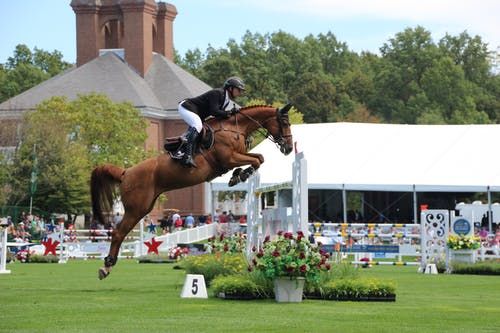- The equine brain is driven primarily by fear.
- Most newcomers to riding are afraid of horses, and for good reason.
- Learn how to teach fear management for daily life.

Grace Earley/pexels
Short mottoes are effective because they are memorable while our minds are busy playing sports, giving presentations, learning something new, or parenting under pressure. In horse training and riding instruction, I create them often. One of my favorites is “never punish fear.”
Fear is something horse people deal with frequently. The equine prey brain is driven primarily by fear. It has evolved to keep horses alive by noticing anything potentially dangerous… which to a horse could be, well, anything. A few blades of grass wiggle, a twig snaps, a bicycle approaches, and our horses are off to the races. So horse trainers spend a lot of time retraining equine fear, and riders or carriage drivers must learn how to manage it.
We humans experience plenty of fear, too. Most newcomers are afraid of horses—and for good reason. The average horse weighs about 1200 pounds (544 kilograms) and stands 64 inches (1.6 meters) high at the top of the shoulder. His neck and head rise upward from there. This huge animal is also extremely agile. He can spin 180 degrees, leap 20 feet sideways, or flip himself upside down in the blink of an eye. Once he gets going, he can run 44 miles per hour with no attention to where he is going. It pays to learn equestrian safety techniques and remain cautious.
“Never punish fear” means that instead we have to educate its management in both human and equine minds. I use the term “punish” loosely here. We “punish” humans not only physically, but also by scolding, humiliating, ignoring, or excluding. Similarly, horses can be “punished” by separating them from herd members, turning in tight circles, shouting, or employing direct eye contact.
Too often, in human and equine life, we judge the object of fear instead of simply addressing it. Most adults are not afraid of bicycles, so we tend to assume that a horse’s fear is silly. We forget all the reasons a horse might be afraid of a bike—it’s novel, it shines and glints in the sun, it moves and carries humans so it could be animate.
The horse’s brain is wired to notice potential risk and run instantly. It is not wired to evaluate the item. A horse in the savannah who ponders why the tall grass is moving in the still of dawn is likely to become a lion’s breakfast. To ensure survival, evolution fashioned a brain that runs now and lets someone else do the pondering later.
I tell riding students to let me know of their fears. Then I can help students to overcome them. This is especially important for young children, who are taught to follow adult commands rather than question them. I try to keep children on ponies instead of horses, whose smaller size is safer for them. I don’t allow observers to question aloud whether a rider is “a wimp” or is “timid.” Anyone with intelligence should be timid at times while working around or on top of enormous powerful animals with minds of their own!
I assure all students (adults and children) on day one that I will not ask them to do anything scary without teaching them how to do it first. And that teaching is gradual, building up slowly from the easiest version of a task to more challenging forms over time. This way, fear does not become part of the equation. You can see kids heave a sigh of relief when this promise is extended. Once taught, they will become able to do scary things on horses and manage small frights, partly because there was never a down side to admitting their fear.
A similar technique can be used with horses. A horse might be scolded for a known misbehavior, but she should not be scolded for fear. Instead, she can learn gradually through human example, observation of older horses, and a kind trainer’s daily instruction that the bicycle is not animate, and the snapping twig doesn’t necessarily mean that death is imminent. Even mild forms of punishment like scolding only increase a horse’s fear. And I’m pretty sure it does the same for humans.
You might want to develop your own short mottoes for your particular needs. But I think “never punish fear” is decent advice for all of us, no matter what we do.
